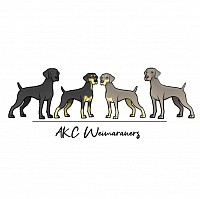Health Testing here at LAAT Weims
⬇️ ⬇️ ⬇️ ⬇️ ⬇️ ⬇️ ⬇️ ⬇️
I will be testing for:
(Once tests are completed, results will be posted!)
Paw Print Genetics are partnering with Orivet. So right now all my online testing isn't showing up but they will be as soon as they finish merging.
* Hyperuricosuria Aliases: Urolithiasis, HUU
Hyperuricosuria (HUU) means elevated levels of uric acid in the urine. This trait predisposes dogs to form stones in their bladders or sometimes kidneys. These stones often must be removed surgically and can be difficult to treat.
Results:
🐾 Honey - CARRIER
🐾 Sassenach- CARRIER
🐾 Aladdin- NORMAL/CLEAR
🐾 Phire-
🐾 Moon-
* Spinal Dysraphism Aliases: SD
Myelodysplasia is usually an inherited disease where each parent must pass on a copy of the defective gene in order for the puppies to be affected... There is a genetic test for spinal dysraphism in Weimaraners, which is the breed where this disease is most prevalent.
Results:
🐾 Honey - NORMAL/CLEAR
🐾 Sassenach- CARRIER
🐾 Aladdin- NORMAL/CLEAR
🐾 Phire-
🐾 Moon-
*Hypomyelination is also called "tremors" and "shaking puppies" by dog breeders based on the fact that affected puppies have tremors when awake as early as 2 weeks of age. Clinical signs resolve in most cases by 3-4 months of age. Some of the dogs may have a mild persistent tremor of the hind legs.
(SPS) Shaken Puppy Syndrome
Results:
🐾 Honey - NORMAL/CLEAR
🐾 Sassenach- NORMAL/CLEAR
🐾 Aladdin- NORMAL/CLEAR
🐾 Phire-
🐾 Moon-
CDDY / CDPA / IVDD -
* Chondrodystrophy is the abnormal development of cartilage. It causes the long bones of the body to grow at an abnormal rate and results in shortened legs. ... A chondrodystrophic dog can be a purebred or a mixed breed that inherited the short leg appearance.
(CDDY) refers to abnormal cartilage growth and bone development. Many dog breeds like Dachshunds, Bulldogs, Corgis, Pugs, French Bulldogs, Bassett Hounds, Pekinese's, Lhasa Apsos, Shih Tzus, Beagles, etc. are defined as having shorter than normal limbs.
- Intervertebral disk disease (IVDD) may be described by your vet as a ruptured, slipped, bulging or herniated disk in your dog's back or neck. While this condition can happen in any breed of dog, it is most commonly seen in dachshunds, Pekingese, shih tzus, basset hounds and beagles.
Results:
🐾 Honey - NORMAL/CLEAR
cd/cd No Leg Shortening Associated with CDPA
🐾 Sassenach- NORMAL/CLEAR
cd/cd No Leg Shortening Associated with CDPA
🐾 Aladdin- NORMAL/CLEAR
cd/cd No Leg Shortening Associated with CDPA
🐾 Phire-
🐾 Moon-

